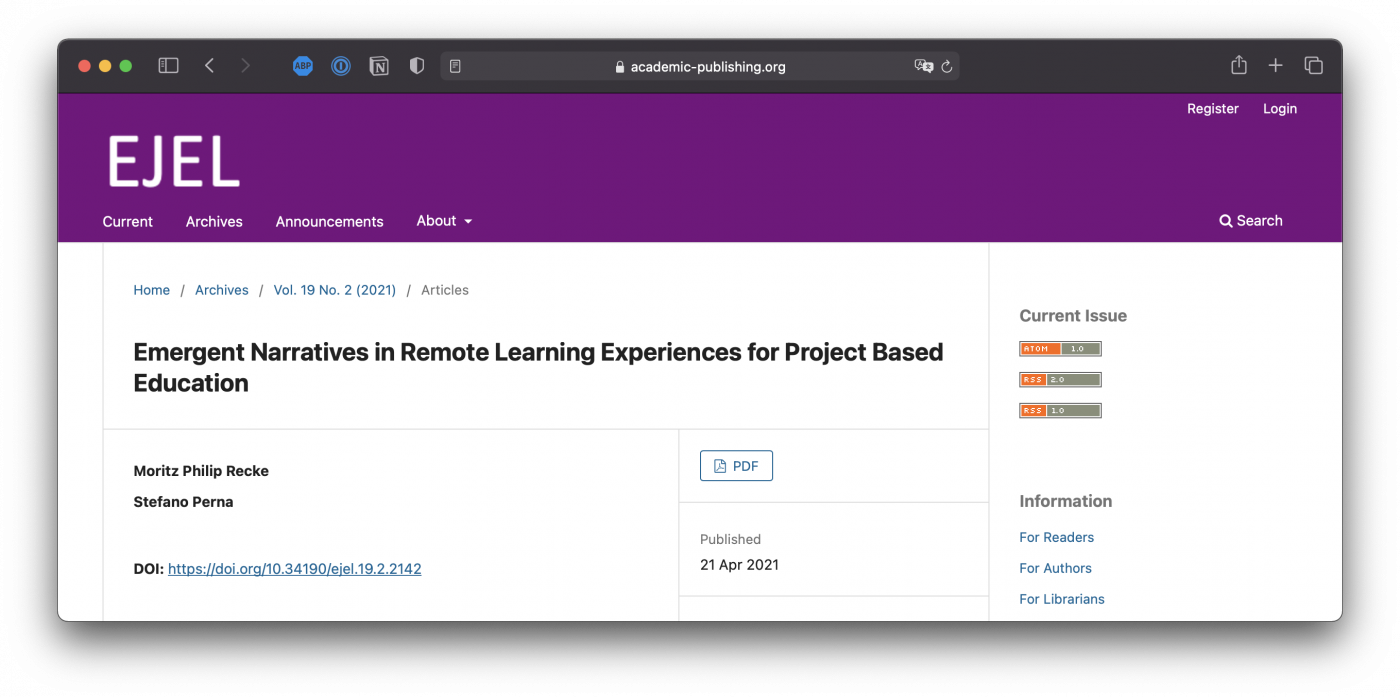Journal Paper on Emergent Narratives in Remote Learning Experiences for Project Based Education

Building on prior publications of the application of narrative theory on the context of learning experience design, Stefano Perna and I presented recent results of our work in an academic journal, the Electronic Journal of e-Learning (EJEL). The paper is called “Emergent Narratives in Remote Learning Experiences for Project Based Education”. It is an open access journal and the work is licensed under a Creative Commons Attribution-NonCommercial-NoDerivatives 4.0 International License. The article was published in April 2021 in Vol 19 No 2.
Abstract: The University of Naples Federico II (Italy) offers a nine-month formative training program aimed at software development for the Apple technology ecosystem to ~400 learners per year and utilises the Challenge Based Learning (CBL) methodology as a framework for learning. As a collaborative and self-guided, inquiry-based learning method, it focuses on learners’ intrinsic motivation while working on real world problems organised in projects (Challenges in CBL) with an experiential and progressive approach to apply acquired knowledge in real world scenarios, ideate solution concepts and build innovative digital products. To overcome limitations of spiral curriculum or elaboration theory, the authors applied narrative theory to design the program’s educational experience for the academic year 2019/2020 as a cohesive journey within a communal learning environment with a coherent and connected structure of narratively driven learning Challenges. The authors present concepts to develop their approach further towards an emergent narrative experience design system to manage the educational journey as it develops, rather than scripting it. This paper evolves the authors’ Narrative Experience Design Canvas to model educational experience design that encourages unscripted, emergent narratives for experiential education with the goal of fostering learners’ engagement, agency and creativity. Derived in part by models developed for digital interactive storytelling or educational video games, it categorises the components for designing an educational experience that allows the learning progression to be driven by learners as co-authors and describes mechanisms that allow unscripted narratives to emerge based on intrinsic motivation. Additionally, the authors present considerations for synchronous and asynchronous learning to evolve their framework for application in blended or remote learning scenarios. Drawing upon findings for remote learning and experiential e-learning – ee-learning – presented by scholars as well as implications identified during the COVID-19 pandemic and the resulting switch to remote learning within the program at University of Naples Federico II in 2020, it is shown how combining narrative elements with experiential e-learning principles can result in increased engagement, motivation and sense of community in learners. Using the example of an individual learning unit – a Challenge – considerations from overall course design down to day-to-day learning activities within the course are presented. For the future, the authors indicate action points to develop this model into an Emergent Narrative System for designing narratively driven and experiential software development education programs and indicate areas of further research on learning activity design for blended or remote learning experiences.
cite as: Recke, M.P. & Perna, S., 2021. Emergent Narratives in Remote Learning Experiences for Project Based Education. The Electronic Journal of e-Learning, 19(2), pp.59–70. DOI: 10.34190/ejel.19.2.2142.
The paper is connected to work done at the University of Naples Federico II’s Apple Developer Academy, where my co-author Stefano Perna and myself are faculty members. In various other publications we explored concepts of narrative theory in context of learning experience design and how it can be leveraged in active learning environments. This particular paper addresses the design of learning experiences with considerations for blended or remote scenarios derived from findings during the COVID-19 pandemic. It also introduces an updated version of the Narrative Experience Design Canvas as a tool for educators to design learning experiences.
Related


